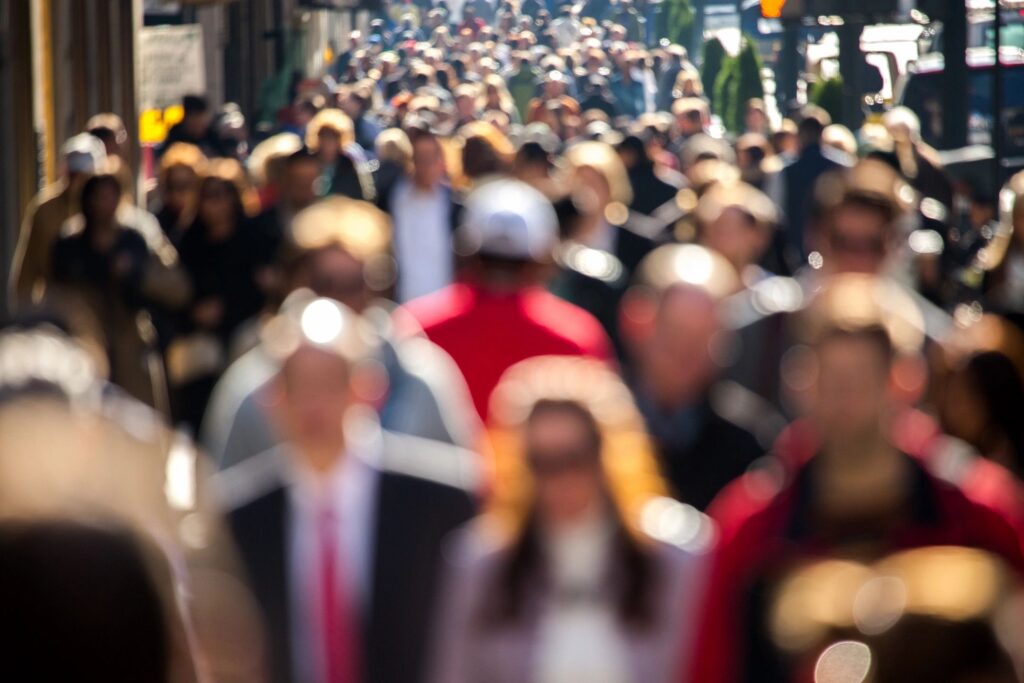
Loneliness has been described as the gap between the social connections you want to have and the connections that you actually have. Loneliness comes in many forms from rejection based on difference, to physical isolation. There are many more reasons for feeling lonely than social isolation alone – for instance bereavement, divorce, separation, children leaving home. Social media has exacerbated feelings of loneliness by, paradoxically, giving people more ways to connect whilst also physically isolating them from each other as they immerse themselves in the Meta world. Social media might offer virtual interaction but it fosters deep isolation. Loneliness is further amplified by the online “smoke and mirrors” effect where people show only the happy moments and none of the realities of their lives. The tendency is to present the shiniest, happiest, most social, successful version of themselves to the world. They might in fact feel deeply isolated and profoundly lonely. A 2004 study discovered that social media has given people more ways to connect but also given them more opportunities to lie about what they present to the world. The result is a society where individuals are seemingly connected but emotionally adrift.
Vivek Murthy, the US Surgeon General and a top public health official, described loneliness as “like hunger – a signal that we’re lacking something for survival”. Murthy warned that loneliness poses the same kind of health risk as smoking 15 cigarettes a day. In short, loneliness and isolation cause significant health challenges, even increasing the risk of cardiovascular disease, immune disorders and early mortality.

According to a global survey in 2021, 33% of adults worldwide feel profoundly lonely with people in Brazil feeling most lonely. In Japan, the term hikikomori was coined to describe young adults who confine themselves to their homes indefinitely, withdrawing completely from society in a move that’s been described less as a clinical phenomenon and more as a social one. We all know someone who is profoundly lonely but, a word of caution here, it may not be the person that you think. Loneliness is a taboo subject and sometimes the most profoundly isolated person may be the life and soul of every party. In Ireland more than 1 in 3 adults describe themselves as lonely or isolated. In the US about half of adults say they’ve experienced loneliness. It’s interesting that at this moment in history, when we seem more connected than ever, loneliness is afflicting millions of us. Loneliness persists in teenagers and young adults, in elderly people, in adults who live alone, in people who identify as LGBTQ++, in people with eating disorders, and factors like race, ethnicity and disability all intersect with experiences of loneliness. Moreover, global phenomena such as migration, famine, and war have fractured families and communities, leaving individuals displaced and adrift in unfamiliar territories without the support of friends and loved ones, feeling lost and alone.
What does this pervasive loneliness signify for us as a society and what can we do about it starting with our own behaviour? In confronting the epidemic of loneliness, we must collectively challenge the stigma surrounding it, recognizing it as a shared human experience rather than a personal failing. This necessitates a concerted effort to change perceptions. Initiatives like the Age Concern television ads and online adverts encouraging social engagement, along with community outreach programs, peer support groups and therapy can all serve as catalysts for change. Moreover, simple acts of kindness can make a profound difference in combating loneliness. As well as closely observing our own friends and family to ensure they are okay, we can also look to the wider community. Whether it’s reaching out to a neighbor who lives alone, making and catching up with friends across age groups, or extending a helping hand to people in need by getting in touch with local charities, these gestures can serve as lifelines, forging connections between people that can be incredibly rewarding for everyone concerned.
The journey to combat loneliness often begins with the crucial step of recognizing the problem. Yet, for many individuals, this acknowledgment may not come easily. Without a high level of self-awareness, we can remain oblivious to our own feelings of isolation. In such cases, the intervention of a compassionate outsider becomes invaluable. Particularly for those deeply entrenched in loneliness, the inertia, and inability to take action, can be overwhelming. They may require a gentle push, a guiding hand extended by someone who notices their struggle and offers support. This could be in the form of an open conversation, or a gently question which could serve as a catalyst for change, prompting someone to explore avenues to connect to people based on shared passions or to seek out resources (such as helplines like the Samaritans). Until we acknowledges loneliness, we’ll stay in its grasp.
With great swathes of society reporting loneliness, it can feel overwhelming. We can help ourselves and each other by taking small steps. Try some of the following:
- We’re a bonding species. We have to stay connected to people. Yet it’s a typical reaction to pull away from people when we’re feeling low. To stay positive, we have to put the effort in and push ourselves to stay connected to people around us. Ask yourself: what can I do? Who can I go out with? Who can I text? How can I serve others? What clubs could I join?
- Reach out to a neighbor or friend who may be experiencing loneliness. A simple phone call, a text message or visit can make a world of difference.
- Join clubs or community groups that align with your interests, providing opportunities to meet like-minded individuals and forge friendships.
- Volunteer for local organizations or charities, offering your time and skills to support those in greater need than you.
- Cultivate gratitude and appreciation for the friendships you have, cherishing the richness that genuine human connection brings to your life.
- Start a conversation. Music is my medium through which to talk to others. One can broach subjects through music and lyrics that might otherwise be difficult to bring up in an everyday conversation. Artists such as Adele, and Lana Del Rey have crafted poignant ballads that capture the essence of loneliness, tapping into universal emotions that transcend boundaries of age, gender, and culture. Television can be another conversation starter. Thought-provoking documentaries such as “The Social Dilemma” and “American Factory,” offer viewers a window into the lives of people grappling with loneliness in contemporary life and open lots of opportunities for discussion. Books, like Normal People, also offer narratives that explore the depths of human emotion reminding us that we are not alone as long as there are fellow humans about and we reach out.
- Be kind to yourself. Fostering self-acceptance means you can acknowledge your feelings of loneliness without judgment, recognizing them as a natural part of the human experience and not a reflection of personal failure or inadequacy.
In Conclusion
We’re a bonding, community-focused species. If I’ve experienced loneliness (which I absolutely have done), and if you’ve experienced loneliness then others are certainly experiencing it too. We can’t always see who is lonely or sad or traumatised. It can be hard to spot. We can’t always tell by looking. By being kind, by being inclusive, by being open to the possibility that the loudest, funniest person might be lonely, we can, in a small way, help to fight the loneliness epidemic.
